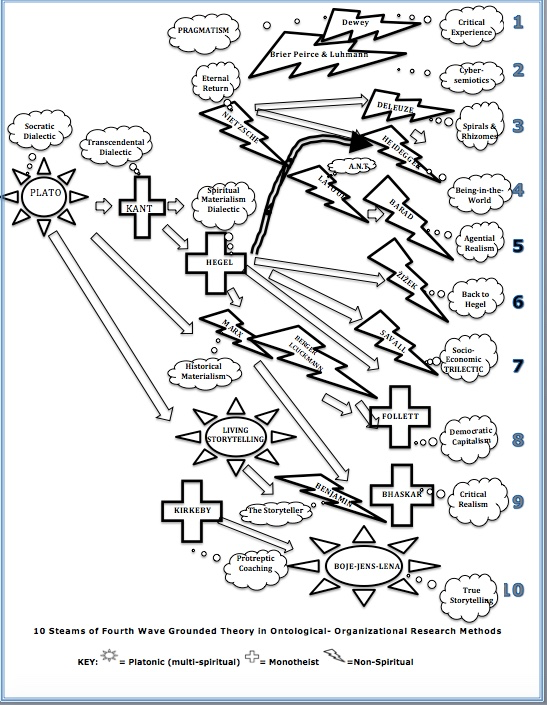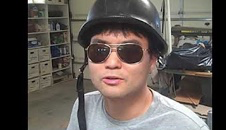Organizational Research Methods: Storytelling in ActionDavid M. Boje Book being prepared for Routledge, due March 2018 To cite this document: Boje, David M. (2018) "Organizational Research Methods: Storytelling In Action", (March 15), URL = <https://davidboje.com/ORM_Storytelling_in_Action_Book/> |
STUDYGUIDES for YOUTUBES for ONTOLOGICAL-ORGANIZATIONAL RESEARCH METHODS (O-ORM): Storytelling in Action by David M. Boje (London: Routledge, due March 2018).
TABLE OF CONTENTS
Then Begin Swimming in each of the 10 Streams of O-ORM.
Table 1: WHAT ARE 10 'ONTOLOGICAL-ORGANIZATIONAL RESEARCH METHODS' O-ORM)? |
||
|
10 EXEMPLARS of STREAMS |
ONTOLOGIC METHOD |
1 |
DEWEY (American Pragmatism) |
Qualitative-MULTIPLICITY |
2 |
SØREN BRIER (<-Peirce + Luhmann) |
Qualitative-MULTIPLICITY |
3 |
GILLES DELEUZE (<-Nietzsche & Freud) |
Qualitative- & Numeric-MULTIPLICITY |
4 |
MARTIN HEIDEGGER (<-Hegel & Nietzsche) |
+ DIALECTIC |
5 |
KAREN BARAD (<-Bruno Latour & Neils Bohr) |
Qualitative-MULTIPLCITY |
6 |
SLAVOJ ŽIŽEK (<-Hegel & Lacan) |
- DIALECTIC |
7 |
HENRI SAVALL (<-Hegel & Plato) |
+ TRILECTIC |
8 |
MARY PARKER FOLLETT (<-Hegel & Whitehead) |
+ DIALECTIC |
9 |
ROY BHASKAR (<-Hegel & Heidegger) |
+ DIALECTIC |
10 |
DAVID BOJE, JENS LARSEN, LENA BRUUN (<-Plato, Ole Kirkeby, & Walter Benjamin) |
+ DIALECTIC/ Qualitative-MULTIPLICITY |
There are 10 streams of Ontological-Organizational Research Methods (O-ORM). Each has a different ontological method being applie in ORM. Ontology is defined as the meaing of Being, our existence in the world and the universe. I have chosen exemplars who are protagonists and antagonists in developing O-ORM that I consider a 4th Wave Grounded Theory. Some of the exemplars do O-ORM with either a + or a - DIALECTIC method (or + Trilectic, in case of Savall). A + dialectical method (e.g. Heidegger, Follett, Bhaskar) builds on or greatly revises Hegel's thesis-antithesis-synthesis model. A - DIALECTIC is also extending Hegel and/or Plato, but in a 'negation of the negation' approach (See Hegel Study Guide; and Plato Study Guide). Heidegger (1962), moves a way from a 'negation of the negation' dialectical method and develops a different approach to time in his classic, Being and Time book. Others do O-ORM with Qualitative-&/ or a Numeric-MULTIPLICITY series method. A Qualitative-MULTIPLICITY series can be as different as the assemblage networks of Latour, the entanglement of Barad, Peirce's series of traids in semiotics, or the early work of Deleuze, the Logic of Sense and Difference and Repetition books. Later work by Deleuze with Guattari is about Numeric-MULTIPLICITY, the body-without-organs (BwO), the war machine, the kinds of exploitive capitalism that is furthers capture by enslavement. Deleuze wrote against dialectics of both Plato and Hegel, finding them - (negative) and was instead focused on multiplicities that did not become progress narratives, life getting better with each repetition.
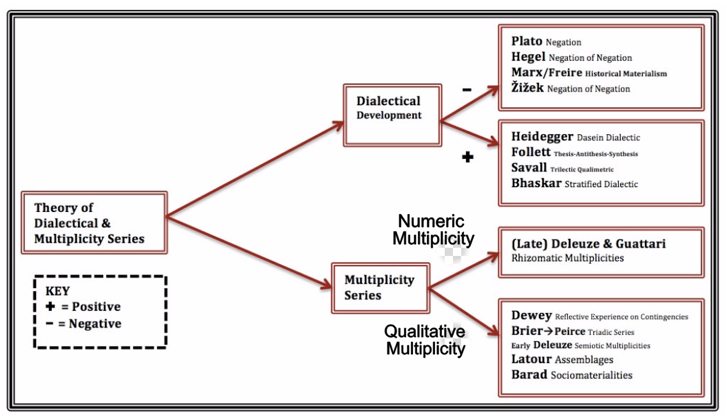
Figure 1: Chart of Exemplars of Dialectical and Multiplicity approaches to Ontological-Organizational Research Methods (O-ORM) (© D. M. Boje, 2017)
Most all ORM ontologists are working to extend into, or to move away from, Hegal, Plato, and Marx & Engel's dialectical notions, which are quite different from each other. You will need a grounding in both (See Hegel Study Guide; and Plato Study Guide; and Marx Study Guide).
Ten Steams of Organizational Research Methods that Co-constitute the 4th Wave Grounded Theory
Figure 2: Ten Streams of Relational Process Ontology Assemblages Co-constituting Fourth Wave Grounded Theory organizational research methods
Each of the exemplars of O-ORM have made significant contributions to either a dialectical develoment or a multiplicity series methodology currently bieng appplied by many other organizational researchers doing what I call "relational process ontology" (RPO). Relations is either dialectical (+ or -) or it is multiplicity (+ or -). I attempt to appreciate all four varieties. Process is approached differently in each of the nine streams. Each has an important difference in the mode and activity of dialectic. Varied relational process ontolgies combine and assemble in the nine streams of the 4th Wave. The purpose of this book is to develop theseight relational process ontology assemblages (patthways) to develop 4th Wave Grounded Theory methodology for O-ORM.
Organizational systems are are not static. Organization systems are ontological relations, processes, and quite ontological. Organizational systems are not just abstract static conecpt models of parts and whole. Rather organizational systems are always moving, changing, in the reality of spacetimemattering of thier Being-in-the-world.
Without 4th Wave, there is no ground and no theory in first three waves of 'Grounded Theory.' The first three waves of grounded theory are not at all ontological in any of the eight streams of relational process ontology. Finding 'ground' is something that is spacetimemattering, not in the inductive fallacy of first three waves, nor the positivistic coding norms what do not do falsification or verification in the ontological. In additin there is an ontological fallacy, of assuming only one ontology, when there are multiple ontologies that form ontologic-assemblages, particular combinations that co-constitute eight streams of 4th Wave Grounded Theory.
Nine Streams (each a chapter) in the 'Organizational Research Methods: Storytelling in Action' book trace their complicity in nine streams in he quest for the flame of truth and 'true' storytelling.
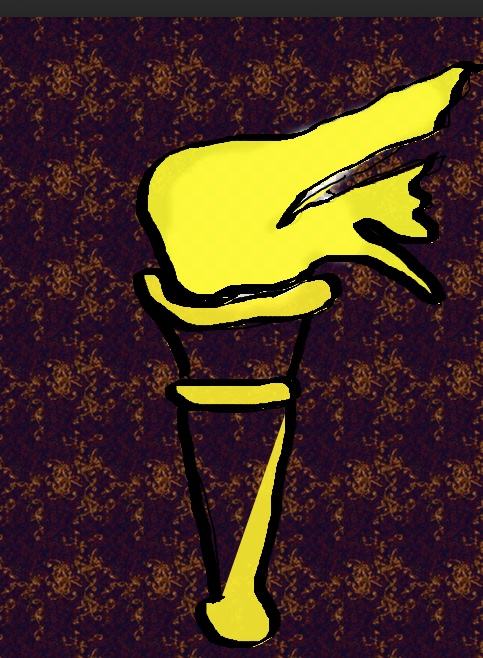
Flame of Truth (image by D. Boje, 2017)
These are presented in the paradigm map. Each has a different answer to what is 'true' storytelling-in-action, the theme of my new book for Routledge, coming due March 2018.
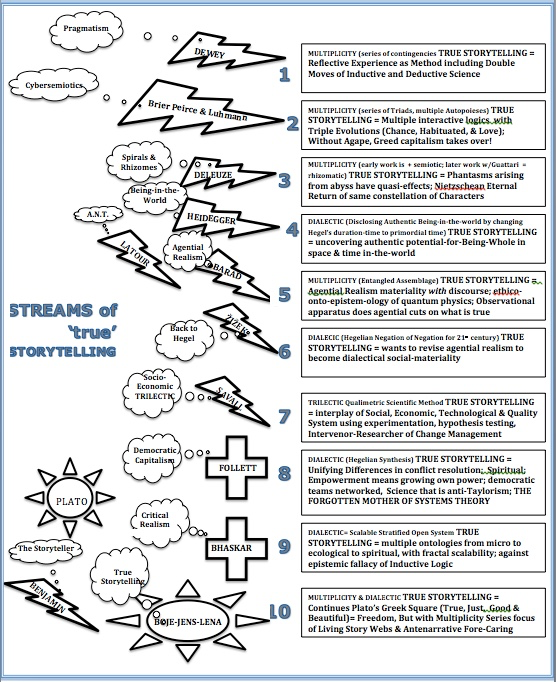
Figure 3: How the 10 Streams approach the question, What is True Storytelling? (original drawin © D. M. Boje, 2017).
This is a summary of the approach to TRUE STORYTELLING in the nine streams of O-ORM:
STREAM 1. MULTIPLICITY (series of contingencies TRUE STORYTELLING = Reflective Experience as Method including Double Moves of Inductive and Deductive Science
STREAM 2. MULTIPLICITY (series of Triads, multiple Autopoieses) TRUE STORYTELLING = Multiple interactive logics with Triple Evolutions (Chance, Habituated, & Love); Without Agape, Greed capitalism takes over!
STREAM 3. MULTIPLICITY (early work is + semiotic; later work w/Guattari = rhizomatic) TRUE STORYTELLING = Phantasms arising from abyss have quasi-effects; Nietzschean Eternal Return of same constellation of Characters
STREAM 4. DIALECTIC (Disclosing Authentic Being-in-the-world by changing Hegel’s duration-time to primordial time) TRUE STORYTELLING = uncovering authentic potential-for-Being-Whole in space & time in-the-world
STREAM 5. MULTIPLICITY (Entangled Assemblage) TRUE STORYTELLING = Agential Realism materiality with discourse; ethico-onto-epistem-ology of quantum physics; Observational apparatus does agential cuts on what is true
STREAM 6. DIALECIC (Hegelian Negation of Negation for 21st century) TRUE STORYTELLING = wants to revise agential realism to become dialectical social-materiality
STREAM 7. TRILECTIC Qualimetric Scientific Method TRUE STORYTELLING = interplay of Social, Economic, Technological & Quality System using experimentation, hypothesis testing, Intervenor-Researcher of Change Management
STREAM 8. DIALECTIC (Hegelian Synthesis) TRUE STORYTELLING = Unifying Differences in conflict resolution; Spiritual; Empowerment means growing own power; democratic teams networked, Science that is anti-Taylorism; THE FORGOTTEN MOTHER OF SYSTEMS THEORY
STREAM 9. DIALECTIC= Scalable Stratified Open System TRUE STORYTELLING = multiple ontologies from micro to ecological to spiritual, with fractal scalability; against epistemic fallacy of Inductive Logic
STREAM 10. MULTIPLICITY & DIALECTIC TRUE STORYTELLING = Continues Plato’s Greek Square (True, Just, Good & Beautiful)= Freedom, But with Multiplicity Series focus of Living Story Webs & Antenarrative Fore-Caring
STREAM STUDY GUIDES & YouTube VIDEOS
Introduction to 9 Streams: Finding our way to 4th Wave Grounded Theory O-ORM
STREAMS OF 'ONTOLOGICAL-ORGANIZATINAL RESEARCH METHODOLOGIES' (O-ORM):
- All Nine O-ORM streams begin with or discounting Plato's dialectic STUDY GUIDE and See Boje's YouTube video (34 minutes) on 4th Wave Grounded Theory and the ways Plato's Dialectic can help organizaitonal research methods with a 'conversational interviewing' method, and a double twisted spiral
- Six exemplars revise Hegel's dialectic STUDY GUIDE (Heidegger, Žižek, Savall, Follett, Bhaskar, Benjamin/True Storytelling; see Video # 2 on Hegel and Marx/Engels
- Two supplemental guides extend Marx & Engel's historical materialism dialectic STUDY GUIDE (Bhaskar, Benjamin/True Storytelling; see Transition YouTube Hegel, Marx and Follett.
-
This episode of Org Res Methods has David Boje and Eugene Sull take on Harley and Samsung with Søren Brier's Cybersemiotics (combines Niklas Luhmann systems theory with Charles Sanders Peirce's semiotics). Video applies these ideas to TQM and storytelling. See study guide at https://davidboje.com/655
STREAM 2: Deleuze’s Rhizomatics and Multifractality in Organization Research STUDY GUIDE
Part 1 of 6, Boje interviews David Trafimow's on his ban on P value significance testing: Part 1 of 6 part series Boje and colleagues interview David Trafimow about his COPERNICAN REVOLUTION of how statistical validity is done, moving away from p-value .05 significance tests and null hypotheses to a new frontier of construct validity. Study Guide at https://davidboje.com/655
Part 2 of 6 Copernican Revolution causal modelling, Boje interviews Trafimow alternative to p-value test. David M. Boje interviews David Trafimow on his better alternative to the absurd .05 p-value test for significance that he has banned in his own journal. The new test is called a priori test and can be used to estimate beforehand size of sample needed. This is part of Organizational Research Methods series, see study guides at https://davidboje.com/655
minutes
Part 3 of 6, Trafimow talks about the lag between knowing p value no use and changing the teaching and publishing habits. Organizational statistics taught to grad students in errant p-value way, though a better way of construct validity is here and now (see Part 2). Study guides at https://davidboje.com/655
minutes
Part 4 of 6 Boje asks Trafimow some Deleuzian Questions: Is he pulling the curtain back on the Wizard of Oz, exposing the phantasm of p-value? Study guides on Copernican Revolution of these changes to construct validity at https://davidboje.com/655
minutes
Part 5 of 6, Boje interviews Trafimow on Revolution of Science Method and Boje concludes with Deleuze project to reverse the negative dialectic of Plato and Hegel with Multiplicity, spirals and rhizomes study guides at https://davidboje.com/655
Part 6 Boje concludes the series on David Trafimow's Copernican Revolution of p vale with how it affects 9 kinds of validity This is because construct validity affects the other 8 kinds of validity. Study guides on Copernican Revolution of these changes to construct validity at https://davidboje.com/655
STREAM 3: Heidegger’s Critical Ontology STUDY GUIDE (3 relational process ontolgoies are Nietzeachean more than Hegelian; see the Heidegger video:https://youtu.be/xHwTORspq8I and Heidegger ontology featured in Boje's organizational research methods
STREAM 4: Barad’s Sociomateriality of Agential Realism STUDY GUIDE and Eugene Sull & Boje
-
: https://youtu.be/bhUMENLzY3M
Latour’s Actor Network Theory STUDY GUIDE (2nd of Nietzechean steams that is also a revision to Hegel) and Latour ANT research methods https://www.youtube.com/watch?v=BHK5p-UStRw&t=69s or https://youtu.be/BHK5p-UStRw
STREAM 5: Žižek’s Revival of Hegelian Dialectics STUDY GUIDE
-
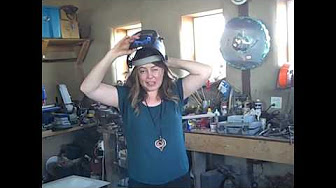 In this episode David Boje and Mabel Sanchez review Slavoj Žižek Hegelian critique of Karen Barad's Agential Realism, from his book Less Than Nothing (2012). In the video Mabel gives her rendition on what Barad might say about this. This is part of a series on organizational research methods. Study guides available at https://davidboje.com/655
In this episode David Boje and Mabel Sanchez review Slavoj Žižek Hegelian critique of Karen Barad's Agential Realism, from his book Less Than Nothing (2012). In the video Mabel gives her rendition on what Barad might say about this. This is part of a series on organizational research methods. Study guides available at https://davidboje.com/655
STREAM 6: Savall’s Socioeconomic, Qualimetrics and Tetranormalizing STUDY GUIDE/ 
STREAM 7: Follett’s Relational Process Ontology extension of Hegelian dialecti STUDY GUIDE - and -
YOUTUBE video Mary Parker Follett and Mabel Sanchez's study of Coalition of Immokalee Workers (CIW) with interview between Boje and Sanchez
Third in series of ORGANIZATIONAL RESEARCH METHODS. This one is about Mary Parker Follett, Mother of Systems Theory. Mabel Sanchez and David Boje take you to the BOYCOTT WENDYS movement by Coalition of Immokalee Workers (CIW), a worker-based human rights organization internationally recognized for its achievements in Worker-driven SYSTEMS of MONITORING and EDUCATION in ending HUMAN SLAVERY in the Tomato fields. for more info https://davidboje.com/655 click on Follett in my new book draft. Thank you
STREAM 8: Bhaskar’s Critical Realism Dialectics STUDY GUIDE ;
STREAM 9: What is True Storytelling Praxis STUDY GUIDE ?(Boje, Larsen, & Brunn article)
Following is overview table of RPO chapter epistemic, relational, process ontologies. The chapters constitute steps in the assemblage formation of the eight streams of 4th Wave Grounded Theory organizaitonal research methodologies.
Table 1: 4th Wave Relational Process Ontologies in 9 Dialectical-Multiplicity Organizing Systems (Boje, 1 August, 2017)
Ontology Stream |
Protagonists |
Dialectical &/or Multiplicity |
Type of Ontology |
Process Standpoint |
Relationality Standpoint |
Socio-materiality |
| 1. Reflexive Method | American Pragmatism--> Dewey | Multiciplicity | Experience as method & double move of induction & deduction | People are part of Nature and we don't need transcendential or universalizaiton | Naturalism plus a focus on ongoing learning | |
2. Cybersemiotic |
Brier-->Peirce & Luhmann |
Multiplicity |
Semiotic & Cybernetic |
Triple Evolutionary |
Autopoietic |
|
3. Spirals & Rhizomes |
Nietzsche -> Deleuze (& Guattari) |
Multiplicity |
Series in movement |
Eternal Recurrences |
Chaos |
Interactive |
4. Authenticity |
Nietzsche to Heidegger |
Dialectical |
Being-in-the-world |
Future in Arrival |
Disclosability |
|
5. Sociomateriality |
Nietzsche, Latour -> Barad |
Multiplicity |
Assemblages |
Agential Realism |
Entanglement |
Intra-activity |
6. |
Plato, Kant,->Hegel -> Žižek |
Dialectical |
Negation of negation |
Emergent becoming |
Spiritual-human-Nature |
Varies by antagonist |
7. |
Plato & Hegel -> Savall |
Dialectical |
Trilectic |
Socio-economic |
Democratic participation |
Within socio-economic framework |
8. |
Plato->Hegel ->Follett |
Dialectical |
Thesis-antithesis-synthesis |
Integration & harmonizing of differences |
Spiritual & democratic |
More social than material |
9. Scalar Open Systems |
Plato, Kant, Hegel, Marx to Bhaskar |
Dialectical |
|
Critical Realism |
Multifractal Scalability |
|
10. True Storytelling |
Plato->Kirkeby-> Boje, Jens Larsen, Lena Brunn |
Both Dialectical & Multiplicity |
‘True’ storytelling |
Antenarrative |
Answerability Ethics |
|
Table 2: 4th Wave Relational Process Ontologies in Dialectical Organizing Systems (Boje, 1 August, 2017)
|
